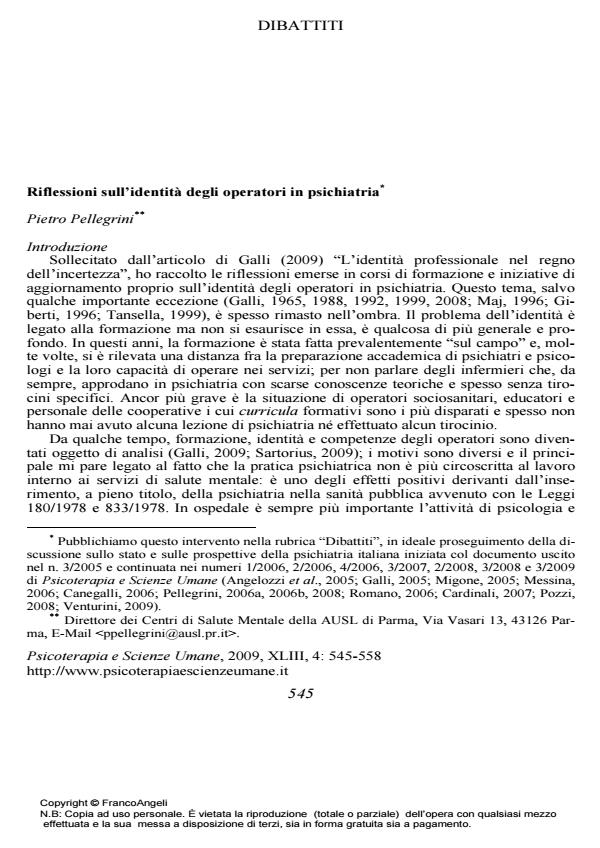Riflessioni sull'identità degli operatori in psichiatria
Titolo Rivista PSICOTERAPIA E SCIENZE UMANE
Autori/Curatori Pietro Pellegrini
Anno di pubblicazione 2009 Fascicolo 2009/4
Lingua Italiano Numero pagine 14 P. 545-558 Dimensione file 396 KB
DOI 10.3280/PU2009-004006
Il DOI è il codice a barre della proprietà intellettuale: per saperne di più
clicca qui
Qui sotto puoi vedere in anteprima la prima pagina di questo articolo.
Se questo articolo ti interessa, lo puoi acquistare (e scaricare in formato pdf) seguendo le facili indicazioni per acquistare il download credit. Acquista Download Credits per scaricare questo Articolo in formato PDF

FrancoAngeli è membro della Publishers International Linking Association, Inc (PILA), associazione indipendente e non profit per facilitare (attraverso i servizi tecnologici implementati da CrossRef.org) l’accesso degli studiosi ai contenuti digitali nelle pubblicazioni professionali e scientifiche.
Reflections on the identity of mental health professionals - The identity of mental health professionals is fragile despite an increasing awareness of the importance of psychological factors in the health system. This crisis stems from work organization, conflicts between therapy and social control, gaps between expectations and actual responses and between needs and interventions, social and cultural issues, identity as reflected by society at large. Responsibilities of mental health professionals are discussed, and the various goals of their mission are analyzed: mental health professionals are supposed to perform as technicians of adaptation, of social revolution, of crisis, of listening, of uncertainty, of pain, and of death. The professionals’ identity encompasses all these aspects, that are related also to personality traits, working styles and institutional climates. Finally, the importance of ethical, cultural and political norms is emphasized.
Parole chiave:Professional identity, mental health professionals, responsibilities, common therapeutic factors, mission
- Dibattiti Pietro Pellegrini, Euro Pozzi, in PSICOTERAPIA E SCIENZE UMANE 4/2013 pp.657
DOI: 10.3280/PU2013-004005
Pietro Pellegrini, Riflessioni sull'identità degli operatori in psichiatria in "PSICOTERAPIA E SCIENZE UMANE" 4/2009, pp 545-558, DOI: 10.3280/PU2009-004006